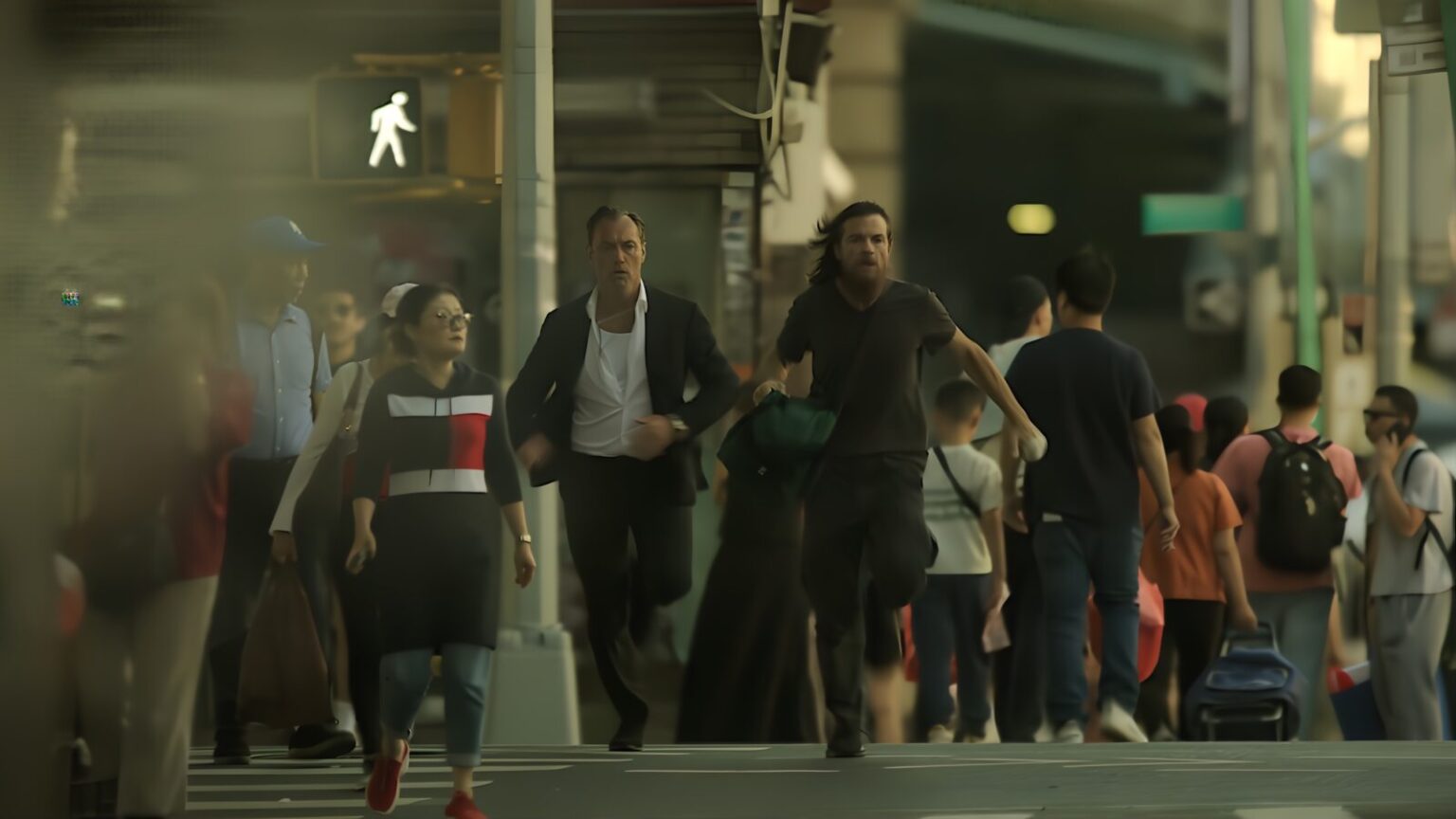TL;DR: Jude Law and Jason Bateman deliver career-best performances in Netflix’s Black Rabbit, a dark brother-versus-brother thriller that’s part mob drama, part restaurant tragedy, and part emotional gut punch. Not a binge-watch—more like a slow-burn descent into chaos.
Black Rabbit
When Netflix drops a prestige thriller, I tend to keep my expectations somewhere between “this will be background noise while I scroll through Discord” and “maybe I’ll get one good monologue out of it.” But Black Rabbit, the new Jude Law and Jason Bateman miniseries, snuck up on me. It’s not just another crime drama with a moody color palette and a soundtrack that sounds like someone fed Spotify the words “urban grit” and “existential despair.” No, this one has teeth. Crooked, nicotine-stained, Cain-and-Abel-shaped teeth. And after eight episodes, I found myself sitting in the dark, staring at my TV like it had just confessed a family secret.
This is not a show you binge in a single weekend unless you actively enjoy panic attacks and whiskey hangovers. It’s a show you absorb, episode by episode, like peeling layers off an onion only to realize the onion is rotten at its core. The story of Jake and Vince Friedken—two brothers who make Succession’s Roy family look like functional brunch companions—is a modern Greek tragedy disguised as a restaurant drama. And much like the restaurant at the center of the show, The Black Rabbit itself, the series promises a place “where the night could go anywhere.” Spoiler: “anywhere” usually means violence, betrayal, and emotional hangovers.
Welcome to the Black Rabbit
The show opens with Jude Law’s Jake, a man who somehow manages to look both slick and exhausted in a way only Jude Law can. Jake owns the titular restaurant, a hip New York hotspot that feels equal parts Michelin-star dream and money-laundering front. For about five minutes, we’re lulled into thinking Jake has his life together: he loves his kid, co-parents amicably with his ex-wife (Dagmara Dominczyk), and delivers a heartfelt speech about creating a restaurant where nights could take unexpected turns. Cue the unexpected: gunmen storm in, shots are fired, lives are shattered.
It’s a bold opening, the kind that demands a rewatch to catch the breadcrumbs you missed while your jaw was on the floor. But instead of riding the adrenaline wave, the show yanks us back one month earlier, the narrative equivalent of slamming on the brakes. Normally I groan when flashbacks enter the chat—too often they’re narrative duct tape—but here they actually work. Black Rabbit juggles present-day chaos, recent past, and even childhood flashbacks with surprising coherence. The backstory isn’t filler; it’s scaffolding for the inevitable collapse.
And then Vince shows up.
Cain, Abel, and the Addict Brother You Shouldn’t Text Back
Jason Bateman’s Vince is the kind of brother who ruins Thanksgiving dinners, steals your car, and still manages to convince Mom that he deserves “one more chance.” He drifts back into Jake’s orbit like a toxic ex who knows exactly when you’re weak enough to say yes. Vince is a compulsive liar, a loose cannon with a rap sheet of enemies, and yet, for a fleeting moment, he slips into the role of prodigal son. Jake, ever the optimist, wants so badly to believe his brother can change. But here’s the gut-punch truth: Vince doesn’t need to ruin Jake’s life; Jake’s blind loyalty will do the job just fine.
The show’s brilliance lies in how Law and Bateman sell this dynamic. They don’t just play brothers—they feel like brothers. The shorthand insults, the defensive humor, the sudden eruptions of rage that vanish as quickly as they appear… it’s the kind of chemistry you can’t fake. Watching them together feels less like acting and more like peering into a lifelong argument you weren’t supposed to overhear.
If Jake is addicted to the illusion of control, Vince is addicted to chaos. Together, they form a cycle of destruction that feels inevitable from the moment Vince steps into frame. And as much as I wanted Jake to break free, I couldn’t help but root for the train wreck.
The Restaurant That Eats Its Own Staff
While the Friedken brothers circle each other like gladiators, the Black Rabbit restaurant itself becomes a pressure cooker for its ensemble of misfits. There’s Roxie (Amaka Okafor), the ambitious chef desperate to carve her own space in a cutthroat industry; Tony (Robin de Jesus), her reliable second-in-command; Anna (Abbey Lee), the bartender with sharper instincts than anyone gives her credit for; and Mel (Gus Birney), the host who radiates “please don’t get me killed tonight” energy.
The series teases juicy subplots within this found family of servers, cooks, and dreamers, but too often they get overshadowed by Jake and Vince’s melodrama. That’s the tragedy within the tragedy: some of the best narrative threads—like the blurred line between staff and “family” in restaurant culture—never get the oxygen they deserve. The show flirts with being The Bear before veering back into mob-debt whodunit territory. And yet, those glimpses of kitchen dynamics, with their mix of camaraderie and dysfunction, feel electric enough to make me wish for a spinoff.
Mobsters, Music, and Rabbit Masks
No crime drama is complete without dangerous people lurking in alleyways, and Black Rabbit delivers with Troy Kotsur’s Joe Mancuso, a bookie with history, gravitas, and an axe to grind. Kotsur doesn’t chew scenery; he looms, his presence hanging over the series like cigarette smoke. His son Junior (Forrest Weber) tries to impress him with hotheaded bravado, while his right-hand man Babbitt (Chris Coy) keeps the circus barely in check.
But it’s not all bullets and broken bones. The show sprinkles in surreal flashbacks to the brothers’ failed rock band days, complete with Jude Law in grunge mode and a nightmare sequence of rabbit-headed bodies. It’s absurd, theatrical, and exactly the kind of stylistic detour that gives the show texture. These aren’t just mobster archetypes and tragic brothers—they’re failed artists, addicts, and dreamers chasing shadows of the lives they could’ve had.
Behind the Camera: Ozark DNA
For anyone who mourned the end of Ozark, Black Rabbit feels like an unofficial reunion tour. Bateman not only stars but directs the opening episodes, proving again that his eye for tension is as sharp as his deadpan delivery. Laura Linney, his Ozark co-star, directs episodes three and four, bringing the same precision she delivers in front of the camera. By the time Justin Kurzel takes over for the finale, the show feels like a relay race where each director adds a distinct flavor but keeps the baton steady.
That behind-the-scenes pedigree is part of why the show feels so consistent, even when the pacing threatens to drown you. Each 45-minute episode hits like a gut punch, demanding you pause, breathe, maybe pour a drink, and then dive back in. Which is why I don’t think the binge model does this show any favors. This isn’t Emily in Paris. It’s not meant to be devoured in a weekend. It’s meant to haunt you for weeks.
The Ending: Realism Hurts
Without spoiling specifics, Black Rabbit sticks the landing. The conclusion is devastating in its realism, the kind that leaves you staring at the credits in silence. There’s no grand moral lesson here, no cathartic redemption arc. Just the slow realization that some relationships, especially family ones, are traps with no exit.
It’s a bleak note, but it feels honest. And maybe that’s why the series lingers. Like The Bear, it’s about people who can’t get out of their own way, only here the stakes involve mobsters, blood money, and a restaurant built on lies.
Final Thoughts
Netflix has a habit of cranking out thrillers that feel like they were written by an algorithm fed on Reddit threads and crime podcasts. Black Rabbit isn’t that. It’s messy, emotional, and at times overwhelming, but it’s also alive. Jude Law and Jason Bateman aren’t just good; they’re magnetic, pulling the series into orbit even when side plots get undercooked.
Will it become the next Netflix sensation? Maybe not overnight. But give it time, and I suspect this show will grow in reputation, the way certain cult classics do. It’s the kind of series you recommend to a friend with the warning: “Just… pace yourself.”







